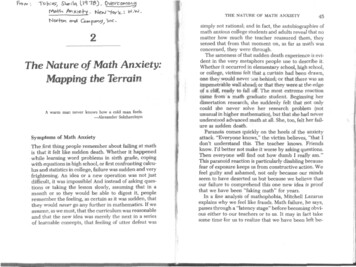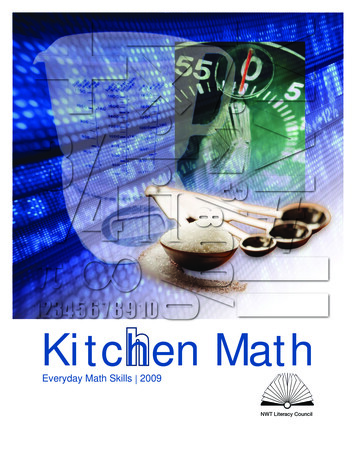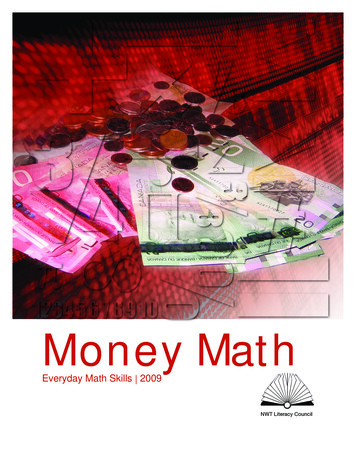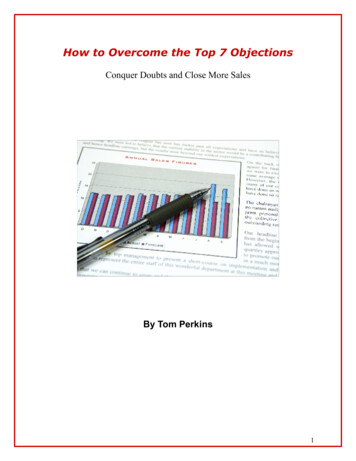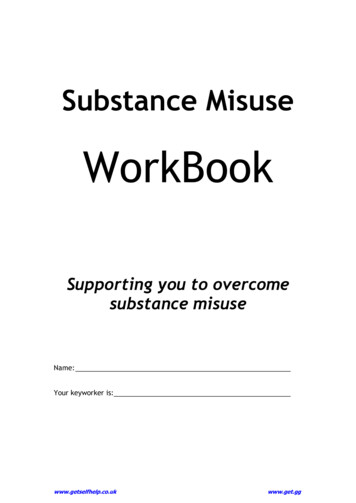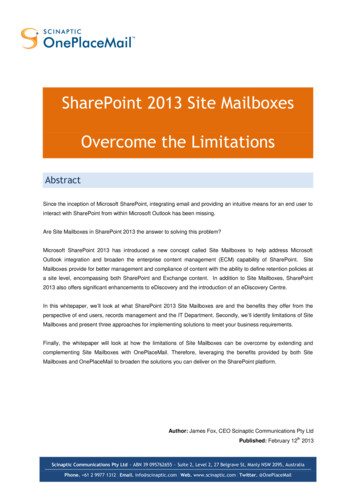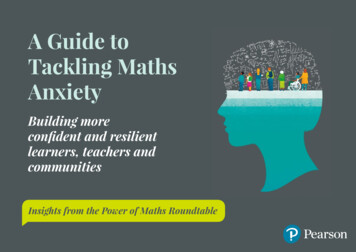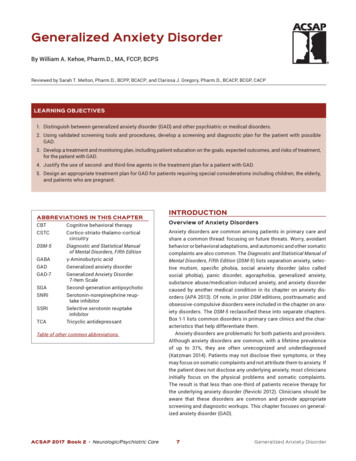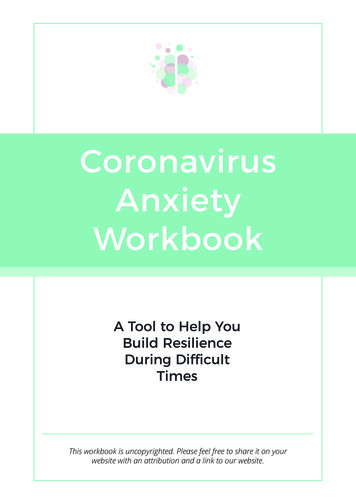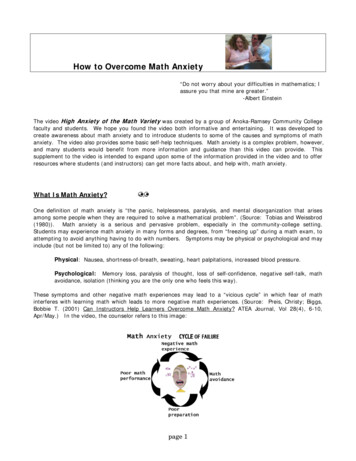
Transcription
How to Overcome Math Anxiety“Do not worry about your difficulties in mathematics; Iassure you that mine are greater.”-Albert EinsteinThe video High Anxiety of the Math Variety was created by a group of Anoka-Ramsey Community Collegefaculty and students. We hope you found the video both informative and entertaining. It was developed tocreate awareness about math anxiety and to introduce students to some of the causes and symptoms of mathanxiety. The video also provides some basic self-help techniques. Math anxiety is a complex problem, however,and many students would benefit from more information and guidance than this video can provide. Thissupplement to the video is intended to expand upon some of the information provided in the video and to offerresources where students (and instructors) can get more facts about, and help with, math anxiety.What Is Math Anxiety?One definition of math anxiety is “the panic, helplessness, paralysis, and mental disorganization that arisesamong some people when they are required to solve a mathematical problem”. (Source: Tobias and Weissbrod(1980)). Math anxiety is a serious and pervasive problem, especially in the community-college setting.Students may experience math anxiety in many forms and degrees, from “freezing up” during a math exam, toattempting to avoid anything having to do with numbers. Symptoms may be physical or psychological and mayinclude (but not be limited to) any of the following:Physical: Nausea, shortness-of-breath, sweating, heart palpitations, increased blood pressure.Psychological: Memory loss, paralysis of thought, loss of self-confidence, negative self-talk, mathavoidance, isolation (thinking you are the only one who feels this way).These symptoms and other negative math experiences may lead to a “vicious cycle” in which fear of mathinterferes with learning math which leads to more negative math experiences. (Source: Preis, Christy; Biggs,Bobbie T. (2001) Can Instructors Help Learners Overcome Math Anxiety? ATEA Journal, Vol 28(4), 6-10,Apr/May.) In the video, the counselor refers to this image:page 1
This “vicious cycle” may lead students to delay or stop taking math courses which often limits their educationalopportunities. In today’s increasingly technical society, it is more important than ever for students to haveknowledge of math. According to Frances Rosamond of National University, “Starting salaries go up 2000per year for every mathematics course after the ninth grade.” A recent Business Week article states“the world is moving into a new age of numbers .just look at where the mathematicians are now. They'rehelping to map out advertising campaigns, they're changing the nature of research in newsrooms and in biologylabs and they're enabling marketers to forge new one-on-one relationships with customers. As this occurs, moreof the economy falls into the realm of numbers.” (Source: Business Week, “Math Will Rock Your World”, Jan.23, 2006).Fortunately, there is help available for students with math anxiety. As the counselor states in the video, “Youtoo can learn to overcome your math anxiety and be successful in math.” Math success leads toeducational success which leads to career success.Do You Have Math Anxiety?A Self Test (Source: http://www.mathpower.com/anxtest.htm)Rate your answers from 1 to 5; add them up and check your score below. (1) Disagree, (5) Agree.1.2.3.4.5.6.7.8.9.10.I cringe when I have to go to math class.I am uneasy about going to the board in a math class.I am afraid to ask questions in math class.I am always worried about being called on in math class.I understand math now, but I worry that it's going to get really difficult soon.I tend to zone out in math class.I fear math tests more than any other kind.I don't know how to study for math tests.It's clear to me in math class, but when I go home it's like I was never there.I'm afraid I won't be able to keep up with the rest of the 512345Check your score:40-5030-3920-2910-19No doubt! You have math anxiety.You're still fearful about math.On the fence!Wow! Loose as a goose! You can put this brochure away, or use it for your friends.Math MythsThe video talked about some commonly-held, but mistaken, beliefs about learning math. These “math myths”may contribute to students’ feelings that they will never be good at math because of conditions that theycannot control and cannot overcome.page 2
Myth One – You have to born with a mathematical brain People who are successful in mathematics aren’t usually born that way. Learning math, like learning in general,takes knowledgeable teachers, willing students, and, most importantly, a great deal of time and practice.Learning math is, in fact, much like learning a language. The symbols and notation make up the rules ofgrammar and the terminology is the vocabulary. Doing math homework is like practicing the conversation ofmath. Becoming fluent (and staying fluent) in math requires years of practice and continuous use. Myth Two – You can’t be creative and be good at math Can you be an artist, writer, or musician and be good at math too? Yes! Math is found throughout literature,art, music, film, philosophy, and is essential to many “creative” fields. Leonardo DaVinci, Mozart, M.C. Escher,and Lewis Carroll are just a few of the artists who used math extensively in their works. Here are a fewinteresting quotes about math in the arts: (source: http://www.mathacademy.com/pr/quotes/index.asp)A man should be learned in several sciences, and should have a reasonable, philosophical and in somemeasure a mathematical head, to be a complete and excellent poet.– John Dryden (poet)Geometry is the right foundation of all painting.– Albrecht Dürer (artist)I am interested in mathematics only as a creative art.– Godfrey Harold Hardy (mathematician)A mathematician, like a painter or a poet, is a maker of patterns. If his patterns are more permanentthan theirs, it is because they are made with ideas.– Godfrey Harold Hardy (mathematician)The mathematician’s best work is art, a high perfect art, as daring as the most secret dreams ofimagination, clear and limpid. Mathematical genius and artistic genius touch one another.– Gosta Mittag-Leffler (mathematician)Math is a wonderful thingMath is a really cool thingSo, get off your “ath” let's do some mathMath, math, math, math, math .-- Jack Black in School of Rock (rocker/teacher) Myth Three – Women are not as good at math as men This myth still keeps women out of the field of mathematics. Even today, very young girls may not beencouraged to investigate the world in the same way that boys are. Boys are given blocks, science kits, andconstruction tools and are encouraged to explore their world in a more mathematical way than are girls. If moregirls were given the same support and opportunities that boys have to excel at mathematics perhaps therepage 3
would be many more high-achieving girls and women in mathematics. (Author’s note: I was never reallyencouraged in math in high school. Not because I wasn’t good at it but because it wasn’t traditionallysomething that girls excelled at. Fortunately, I found the encouragement and support to go into math incollege (it was a women’s college) – NSB).For more discussion of this math myth, check out the Association for Women in Mathematics website:http://www.awm-math.org/Ten Ways to Reduce Math AnxietyIn the video, the counselor (with her “secret weapon”, the “Power Point” presentation), talks about ten self-helptechniques for combating math anxiety:1. Learn stress management and relaxation techniques.Techniques such as deep breathing and meditation that help you to relax in any stressful situation canalso be helpful when dealing with the nervousness and tension that affect students with math anxiety.2. Combat negative thinking.Lack of confidence can be a major impediment for students with math anxiety. Replace those negativethoughts (“I can’t do this”, “I’ve never been good at math”, “I won’t finish in time”) with confidencebuilding affirmations (“I know this”, “I’m prepared”, “I can do this”).3. Visualize yourself succeeding.Athletes use the technique of “visualization” to prepare for major competitions. Imagine yourself beingrelaxed doing math and during a test and confidently solving the problems.4. Do “easiest” problems first.Build up your confidence by first doing those problems in an assignment or on a test that you “know”best. It’ll help you relax when you tackle the “harder” stuff.5. Channel your stress into something else.Free up your mind by relieving some of your physical responses to stress. Get up and run around thehall for a minute before the test or squeeze a stress ball like crazy during the test.6. Start preparing early.If you try to “cram” the material quickly, you are likely to forget it quickly too. If you practice thematerial over a period of time, you will have a better understanding of it and are less likely to forget itwhen under stress.7. Take care of yourself.Although it’s not easy when you’re in school, eating and sleeping well helps your body and mind functionto their fullest potential.8. Try to understand the “why” of math concepts rather than memorizing.The first thing to go when you are under stress is your short-term memory. This is one reason it is soimportant to understand that math is not just a set of rules that you have to memorize but that eachconcept builds on what came before. If you understand the reason behind the rules, you will rememberpage 4
the concepts better and be able to apply them in many different types of problems (not just ones you’veseen before).9. Find a support group.A support group is especially helpful for adults with math anxiety.10. Reward yourself for hard work.After completing a difficult assignment or an exam, it’s time to give yourself a break. Have a chocolate or a party!There are, of course, many more strategies that can help with math anxiety. Check out these websites formore self-helps mbull.kent.edu/academic services/tutoring/strategies.cfmNote: The suggestions listed above are a good way to start to work on overcoming the fear associated withmath, but, since students may suffer from different levels and forms of anxiety, students may also want toconsult their instructors and counselors to get guidance on an individualized program of dealing with mathanxiety.How to succeed? – You need to work at it!Studying Mathematics“If you care at all, you’ll get some results. If you care enough, you’ll get incredible results.”– John Rohn (Author and motivational speaker)“No one has ever drowned in a sweat.”– Lou Holtz“The most practical, beautiful, workable philosophy in the world won’t work – if you won’t.”– Zig ZiglarSometimes good study habits can be the key to overcoming math anxiety. Some students do not realize howimportant studying skills are. The following material contains tips on how to study mathematics at home and inclass, how to prepare for tests, how to take tests, and how to use your time studying the most efficient way.1. How to Plan Your Time(Source: Supplementary Packet assembled by Barb Schewe, Anoka Ramsey Community College)Is your credit load realistic with respect to your other commitments?determine the number of hours you need to study every week.page 5The following chart will help you
School vs. Work vs. Home/Family12 credits/hours in class 24 hours of study time outside of class36 hours needed for college per weekYou may want to limit your number of credits if any of the following apply: you have a job you are the primary caregiver for children or have many family responsibilities you were recommended to take a writing and/or reading course you are concerned about the amount of time one or more of your classes will takeTIMEWORKINGNone31 – 40 hoursCREDIT LOADHOURS IN CLASS16–18 credits/hours inclass12–16 credits/ hours inclass9–14 credits/hours inclass6–12 credits/hours inclass3–8 credits/hours in classMore than 40 hours/week3–4 credits/hours in class1 – 10 hours11 – 20 hours21 – 30 hoursSTUDY TIMEOUTSIDE OF CLASS 32 – 36 study hoursTIME COMMITMENTTO COLLEGE 48 – 54 hours/week 24 – 32 study hours 36 – 48 hours/week 18 – 28 study hours 27 – 42 hours/week 12 – 24 study hours 18 – 36 hours/week 6 – 16 study hours 9 – 24 hours /week 6 – 8 study hours 9 – 12 hours/weekA good exercise: There are 168 hours in a week. Determine your total hours for a week using work,family/home, college commitment, eating, sleeping, commute time, etc. Does it fit in a week? Does it allow any"down" time for you to "recharge?"2. How to Study at HomeHomework is extremely important in learning mathematics. It helps you understand the material, and find outwhat types of problems you have difficulty with, so that you can ask your teacher about those problems later.Make sure you: Set aside adequate time each day to study and discipline yourself to use it.Read over and tidy up your notes.Do enough exercises to achieve mastery.Try to solve every problem in the homework.Make notes to ask your teacher about the problems you could not do or had difficulties with.Ask questions early and often.Analyze your error, make note of it.If possible, find a group of students or a study-buddy to work with.Discuss the homework problems with classmates before class.Help other students with the homework, if you can. There is no better way to learn the material than toexplain it to someone else.page 6
3. How to Study in Class Be ready for the lecture: Have the homework done. Look through the chapter which will bediscussed next, it helps to be more comfortable with the new material.Have everything you might need for the math class ready: pencil, eraser, graph paper,calculator, textbook, and your notebook.Ask questions every time you don’t understand something. Don’t wait until later, new materialis usually based on the previ
What Is Math Anxiety? One definition of math anxiety is “the panic, helplessness, paralysis, and mental disorganization that arises among some people when they are required to solve a mathematical problem”. (Source: Tobias and Weissbrod (1980)). Math anxiety is a serious and pervasive problem, especially in the community-college setting. Students may experience math anxiety in many forms
